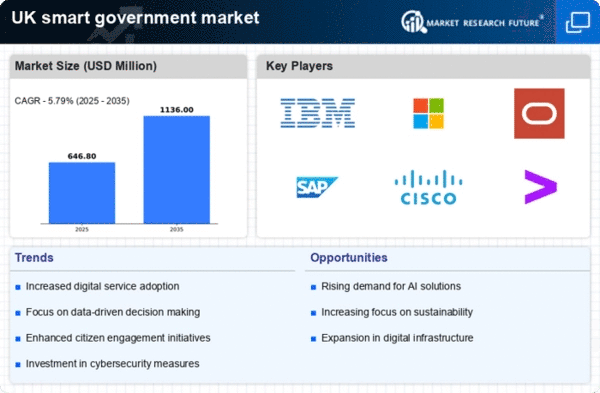Enhanced Citizen Services
The need for enhanced citizen services is a pivotal driver in the smart government market. As citizens become more accustomed to digital services in their personal lives, they expect similar experiences from government entities. The UK government is actively working to digitize public services, aiming to streamline processes and improve user experience. Initiatives such as the Government Digital Service (GDS) have been instrumental in this transformation, with over 90% of users reporting satisfaction with online services. This shift towards user-centric services is likely to stimulate growth in the smart government market, as agencies invest in technology to meet evolving citizen expectations.
Emphasis on Sustainability
Sustainability has emerged as a crucial driver in the smart government market, as governments increasingly prioritize eco-friendly practices. The UK government aims to achieve net-zero carbon emissions by 2050, which necessitates the adoption of smart technologies that promote energy efficiency and reduce waste. Smart grids, for example, can optimize energy distribution, while smart waste management systems can enhance recycling efforts. The potential for cost savings and environmental benefits is substantial, with estimates suggesting that smart city initiatives could save the UK up to £ 7 billion annually. This focus on sustainability is likely to accelerate the growth of the smart government market.
Public Demand for Transparency
Public demand for transparency and accountability is a significant driver of the smart government market. Citizens increasingly expect access to information regarding government operations, spending, and decision-making processes. In response, UK authorities are implementing open data initiatives that allow citizens to engage with government data more effectively. This trend not only fosters trust but also encourages civic participation in governance. The smart government market is likely to benefit from this shift, as technologies that facilitate data sharing and visualization become more prevalent. The UK government has reported that over 80% of citizens support increased transparency, indicating a strong market potential.
Collaboration with Private Sector
Collaboration between public and private sectors is increasingly shaping the smart government market. Partnerships with technology firms enable governments to access innovative solutions and expertise that can enhance service delivery. In the UK, initiatives such as the GovTech Catalyst fund support startups and SMEs in developing technologies that address public sector challenges. This collaborative approach not only fosters innovation but also accelerates the deployment of smart solutions. The UK government has earmarked £20 million for such initiatives, indicating a robust commitment to leveraging private sector capabilities. This trend is likely to drive the smart government market forward, as more agencies seek to harness external expertise.
Integration of Advanced Technologies
The integration of advanced technologies, such as artificial intelligence (AI), machine learning, and the Internet of Things (IoT), is driving the smart government market. These technologies enable public sector organizations to enhance service delivery. These technologies enable public sector organizations to enhance service delivery, improve operational efficiency, and foster citizen engagement. For instance, AI can analyze vast amounts of data to inform policy decisions, while IoT devices can monitor public infrastructure in real-time. The UK government has allocated approximately £1.5 billion towards digital transformation initiatives, indicating a strong commitment to leveraging technology in public services. This investment is expected to yield significant improvements in service quality and responsiveness, thereby propelling the smart government market.
















